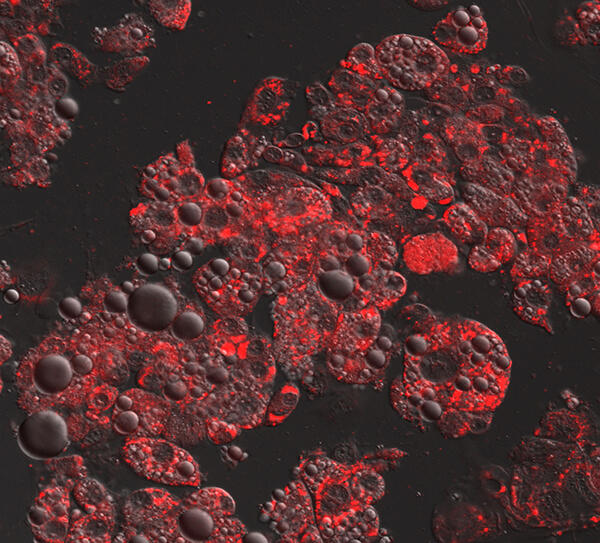Fat Cells May Hinder Effectiveness of Chemotherapy
, by NCI Staff
In a new study, researchers have shown that fat cells can absorb two commonly used chemotherapy drugs and break them down chemically into less toxic forms, potentially reducing the drugs’ effectiveness.
The study investigators, supported in part by NCI, also found that fat cells can absorb, but not break down, one other chemotherapy drug.
By absorbing and breaking down the drugs, the fat cells may be removing the drugs from the immediate environment around tumor cells in bone marrow or other areas of the body where fat cells are plentiful. This finding may help explain why obesity is linked to poorer outcomes in several types of cancer, the study authors wrote November 8 in Molecular Cancer Research.
“This is important work that sheds new light on a mechanism by which obesity and fat cells may cause a worse prognosis for [some] cancers,” said Nathan Berger, M.D., of the Case Comprehensive Cancer Center at Case Western Reserve University, who was not involved in the research.
The new study also provides “the first evidence, to my knowledge, of fat cells metabolizing and inactivating any therapeutic drug,” said lead investigator Steven Mittelman, M.D., Ph.D., a pediatric endocrinologist at UCLA Mattel Children’s Hospital.
Investigating the Basis of ALL Relapse Rates in Obese Children
“This work all started with the observation that children who are obese when they’re diagnosed with acute lymphoblastic leukemia (ALL) have about a 50% higher relapse rate than non-obese children,” Dr. Mittelman said. Obesity is also associated with poorer outcomes in breast, colon, ovarian, and prostate cancer.
“Many cancers occur in an area [of the body] where there are a lot of fat cells,” Dr. Mittelman noted. “The bone marrow, where leukemia likes to live, has a lot of fat cells in it. The colon has a lot of visceral fat around it, and breast cancer is surrounded by fatty tissue in the breast.”
Previous work by Dr. Mittelman and his colleagues showed that fat cells impair the response of leukemia cells to several chemotherapy drugs, including daunorubicin, in a manner that does not depend on cell-to-cell contact.
In the latest study, the team conducted a series of laboratory experiments to better understand the details of how fat cells might reduce the effectiveness of chemotherapy.
To do so, they first grew human ALL cell lines together with either fat cells or fibroblasts (a type of connective tissue cell) and treated the cells with daunorubicin. They found that in the presence of fat cells, but not fibroblasts, the accumulation of daunorubicin in the leukemia cells was markedly reduced.
Further experiments revealed that the fat cells absorbed daunorubicin and broke it down to a less toxic form. And ALL cells grown in cell culture medium (liquid used to grow cells) that had been preincubated with fat cells survived and multiplied better than ALL cells grown in medium preincubated with fibroblasts or with no other cell types.
The team also showed that samples of intact fat tissue from cancer patients could absorb and inactivate daunorubicin, and in preliminary studies in mice, the researchers found evidence that fat tissue has the same effect on the drug in living animals.
Fat cells also absorbed doxorubicin, a chemotherapy drug that is chemically related to daunorubicin, and a third chemotherapy drug, mitoxantrone. The fat cells also broke down some of the doxorubicin to a less active form, but to a lesser extent than was seen with daunorubicin. They did not break down the mitoxantrone at all.
Finally, the team found evidence that human fat cells produce high levels of several enzymes capable of breaking down anthracyclines like daunorubicin and doxorubicin, which are used in treatment regimens for a wide range of cancers. And they detected some of these enzymes in fat cells from bone marrow of children being treated for ALL.
Removing Chemotherapy Drugs from the Microenvironment
Previous studies have generally not shown differences between normal-weight and obese people in the way the body handles drugs like daunorubicin, Dr. Berger and Dr. Mittelman both noted. But those studies have looked only at drug levels in the blood, Dr. Mittelman explained.
“What Dr. Mittelman’s team has shown is that the number of fat cells in the tumor microenvironment may make a difference,” Dr. Berger said.
As the study authors wrote, the ability of fat cells to absorb and even break down certain cancer drugs could reduce the concentration of active drugs in tumor microenvironments rich in fat cells, potentially contributing to the emergence of drug-resistant tumor cells.
With funding from NCI, Dr. Mittelman and his colleagues will conduct studies to support and extend these initial findings. They plan to develop a method to measure the concentration of drugs in the tumor microenvironment in a living person or mouse so that they can assess the effects of nearby fat cells, he said. “Then we can test strategies to overcome the effects of fat cells” on the drugs.
“We need to know the best way to deliver chemotherapy to obese children, or obese patients in general,” he continued. That might mean giving the drugs more often or at higher doses, designing drugs that are resistant to the enzymes in fat cells, or developing treatments that will block those enzymes, he said.
Indeed, Dr. Berger said, “Figuring out how to use [these findings] clinically is one of the next hurdles, and an important area for future research.”
Whether other types of chemotherapy may suffer the same fate as the drugs examined in this study is unclear, Dr. Mittelman said, “but it’s certainly possible that some other known or soon-to-be-discovered chemotherapies could be taken up or even broken down by fat cells.”
